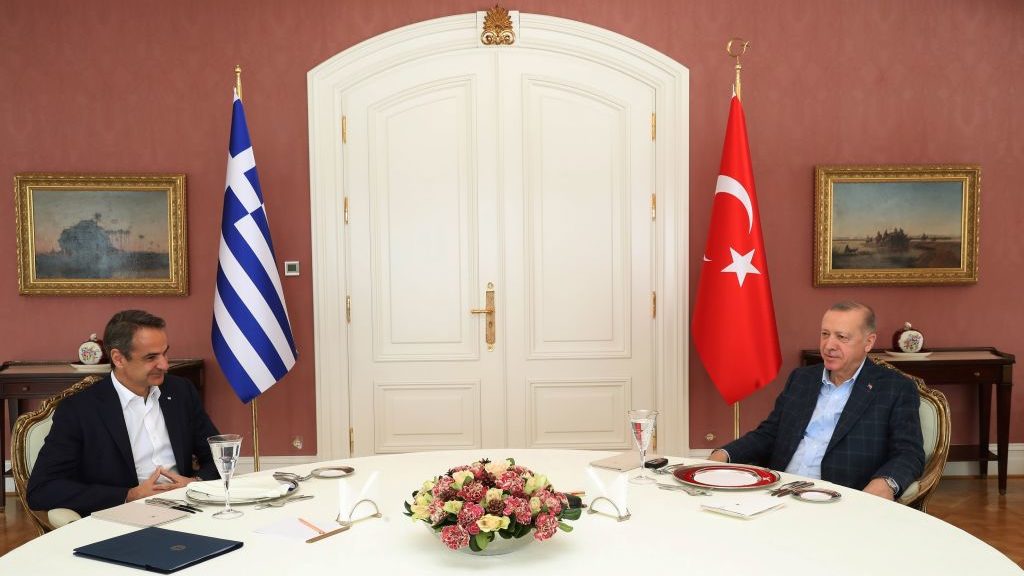Tensions Rise Between NATO Members as Turkey Summons Greek Ambassador
Ankara earlier signaled it wanted to warm ties in bid to find foreign investment for struggling economy
Ankara summoned the Greek ambassador over what is being called protests by the Kurdistan Workers’ Party (PKK) in Athens, Turkey’s state news agency reported. The summons on Friday comes amid growing tensions between the two NATO members.
Ankara has made similar accusations of support for the Kurdish armed group against Finland and Sweden, which are applying for NATO membership.
The PKK has launched a decades-long insurgency in Turkey and is labeled a terrorist organization by Ankara, the United States, and the European Union.
Some pollsters believe the move against the NATO applicants has improved Turkish President Recep Tayyip Erdogan’s approval rating among his nationalist base after his popularity declined amid the country’s struggling economy.
Berk Esen, a fellow focused on Turkish politics at the German Institute for International and Security Affairs, told The Media Line that the Greece-Turkey rift is a response to domestic pressure the Turkish president is facing.
“Leaders who are battered at home or are weakened in public opinion, look for incidents [and] tensions abroad, in order to get an excuse to rally the public opinion,” Esen said. “It seems like Erdogan is really pushing for that.”
Relations between Ankara and Athens recently were strained after Turkey attempted a rapprochement with its rival last year, as well as several other countries in the region, in the hopes of attracting foreign investment.
The Turkish president said this week that his country has canceled talks with Greece.
Two weeks ago, Erdogan stated that Greek Prime Minister Kyriakos Mitsotakis “no longer exists” for him after accusing the Greek official of telling US officials to not give F-16 fighter jets to Turkey, adding that the two agreed not to involve other countries in their dispute.
Leaders who are battered at home or are weakened in public opinion, look for incidents [and] tensions abroad, in order to get an excuse to rally the public opinion
A deal with the US for the F-16s would be especially valuable for Ankara after Washington kicked it out of the F-35 fighter jet program over its purchase of weapons from Russia.
Mitsotakis’ office did not respond to The Media Line for a request for comment.
The Reuters news agency reported on Saturday that the Greek prime minister said, “I think it’s up to Turkey to change its behavior. We have never been the ones pushing the boundaries in terms of aggressiveness.”
Mitsotakis also stated that any energy solution for the EU, which is desperately looking for alternative sources after limiting gas and oil from Russia, would include Greece and that the bloc must look for cost-effective ways of getting gas from Cyprus and Israel.
Ankara has repeatedly stated its interest in working with Israel on an energy deal and has sought to profit from gas found off of Cyprus, a key source of tension with Athens.
Greece and Turkey have been long-time regional rivals. Much of that has been due to a decades-long dispute over control of Cyprus, which is split between Greek and Turkish Cypriots.
After the discovery of gas off the island’s coast, Turkey has argued it has the right to drill for oil due to an agreement with Turkish Cypriots whose control of part of Cyprus is recognized only by Ankara.
Mensur Akgun, a professor of international relations at Istanbul’s Kultur University, told The Media Line that Greece and Turkey may assert their positions with flights and naval exercises, but he does not expect a military confrontation.
“They always find a way to settle the conflict and de-escalate through military mechanisms,” Akgun said.
“This doesn’t mean that anything will not happen, but I don’t expect any kind of mobilization of the two sides vis a vis-à-vis each other,” he added.
The rift comes as NATO leaders are eager to show a united front against Russia after its invasion of Ukraine.
The US State Department said Turkey and Greece should solve their problems diplomatically and “avoid rhetoric that could further raise tensions.”
German Chancellor Olaf Scholz’s spokesperson said that it is an important time for NATO allies to show unity.
Esen said he does not believe that Ankara’s current dispute with Athens will impact relations with NATO and believes other countries know Erdogan is motivated by domestic politics.
However, he cautions that Turkey’s arguments over Sweden and Finland joining the military alliance are more serious and the problem could last for months.
“I’m not so sure it will be easy for [Erdogan] to be bought on this issue,” Esen said.
“I think he wants to negotiate directly with the US [and] the US has been noncommittal so far,” he said.


